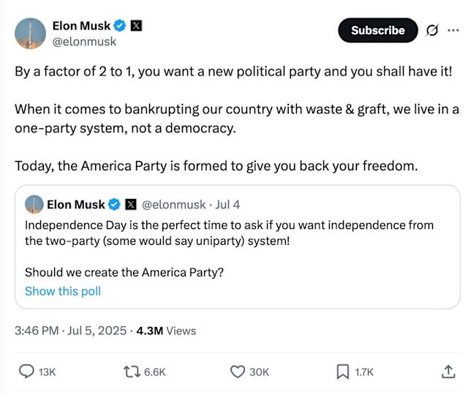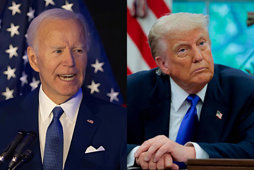
Elon Musk Launches America Party After Trump’s Spending Bill
Elon Musk unveils the “America Party,” criticizing both major parties after Trump signs $3.3T bill.
Musk Targets Political Establishment With New Party
Tech entrepreneur Elon Musk has launched a new political movement, the “America Party,” declaring it a direct challenge to what he called the corruption and stagnation of the current two-party system. The announcement came just one day after President Donald Trump signed the landmark $3.3 trillion “big, beautiful bill” into law, a package encompassing sweeping tax cuts, infrastructure spending, and economic stimulus measures.
Announcing the initiative on X—his own social media platform—Musk pointed to a July 4 poll he posted asking users whether the United States needs independence from what he called the “two-party (some would say uniparty) system.” More than 1.2 million votes were cast, with 65.4% responding yes. “By a factor of 2 to 1, you want a new political party and you shall have it,” Musk wrote. He accused both parties of “bankrupting our country with waste & graft,” adding, “we live in a one-party system, not a democracy.”
Challenging the Two-Party System
The timing of Musk’s announcement—so soon after the passage of Trump’s massive spending bill—underscored growing friction between the billionaire and national leaders in both parties. Musk, who has repeatedly warned of unchecked government spending and its risks for economic stability, suggested that existing parties are not addressing the country’s core problems.
Musk said the America Party’s goal is to win a select number of seats in Congress and form a swing bloc with enough leverage to check what he sees as the excesses of both Republicans and Democrats. While the party’s full platform remains forthcoming, Musk emphasized restoring fiscal responsibility and government accountability.
Reaction to Musk’s announcement was swift and divided. Some conservative voices expressed concern that a third party could siphon votes from the right, potentially making it easier for Democrats to win. “Your third party will disproportionately take votes from the right vs the left and give the left an easier path to power,” wrote conservative commentator Shawn Farash. Others encouraged Musk to reform existing parties from within, while critics questioned the legitimacy of X’s poll, noting it was open and not limited to American voters.
Historically, third parties have struggled to break through in the U.S. political system. The winner-take-all Electoral College, ballot access laws, and entrenched party structures pose steep barriers to outsiders. Notable efforts, such as Ross Perot’s 1992 independent presidential campaign, showed potential but ultimately fell short of securing electoral votes. Despite rare surges, no third-party candidate has managed to win the presidency since the early 20th century.
With the America Party, Musk hopes to disrupt the established order. Whether this movement can survive beyond the current political moment—or overcome the systemic hurdles that have stymied past third-party efforts—remains to be seen. As the new party begins its campaign to win key congressional seats, its success or failure may shape debates about American democracy, fiscal responsibility, and the power of outsider voices in the coming election cycles.






